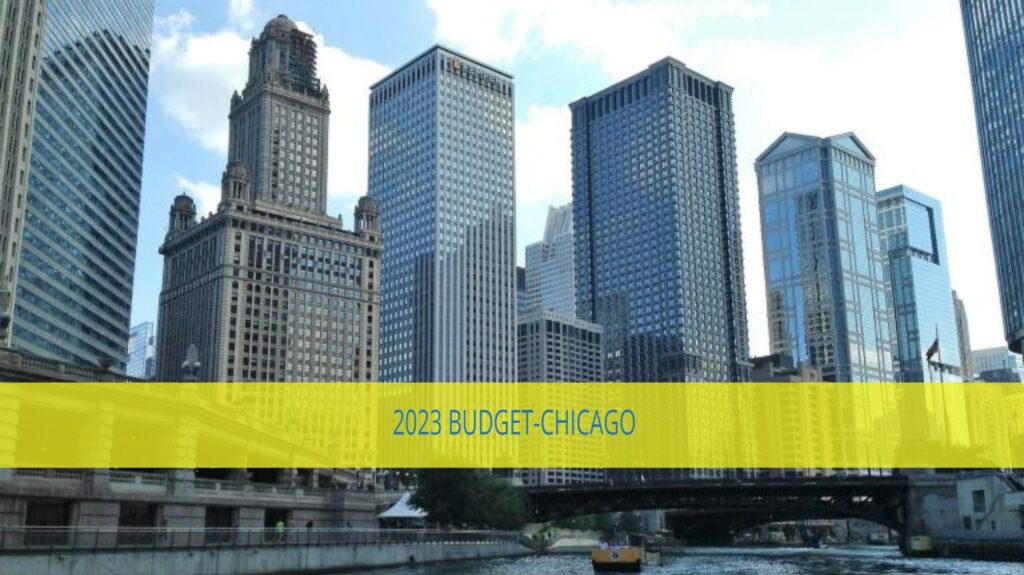Lori Lightfoot, the mayor, has presented a 2023 budget proposal to the city council. The “Stability Budget” for the year 2023 “allows us to fulfill an important obligation we have to our residents and future generations: to seize this once-in-a-lifetime opportunity to transform our city for the better,” Lightfoot said.
Maintaining world-class public services while making Chicago a safer, stronger, and more economically resilient city is a top priority. Lightfoot stated that Chicago’s infrastructure would be fixed with hundreds of millions of dollars. Through the Chicago Works capital plan, “we will be able to use our savings to continue fixing our roads, bridges, and shores,” Lightfoot said. “With the Chicago Recovery Plan, we can build a stronger and more secure city.”
To finance the initiatives outlined in the Chicago Recovery Plan, the city will need to take out a $660 million loan. The mayor also proposed investing $202 million of the city’s surplus into the underfunded pension system. Lightfoot said.” our pensions obligations are real, not a nicety, but a necessity for us to meet. They are counting on us to keep our word from the past.” In excess of $2 billion, a year is being spent on the city’s pension funds at the moment.
New Budget Empowers Youth

Aims at Eliminating Poverty
Services for people who are homeless or at risk of homelessness will receive funding of more than $200 million in the proposed Budget for 2023. Emergency rental assistance, increased outreach to unsheltered Chicagoans, the Expedited Housing Initiative, and ongoing work to stabilize the shelter ecosystem are just some of the ways these funds will be put to use to reduce homelessness.
Additional reforms to fines and fees are included in the 2023 Budget as well, with the goal of reducing Chicagoans’ financial burdens. The debt associated with traffic and vehicular infractions and compliance has been the focus of the Mayor’s efforts to reform fines and fees over the past three years, with groundbreaking programs like Clear Path Relief and Fix-It Defense being implemented in April 2022.
Individuals’ ability to apply for licenses, and permits, and do business with the City will be affected by changes to the Administrative Hearings debt process included in the 2023 Budget. More options for individuals and small businesses to become compliant and relief from punitive fines and fees are both results of these reforms.
Promoting Health
This commitment to Chicagoans’ mental health continues in Mayor Lightfoot’s proposed 2023 Budget, which includes $89 million for such services. Advocacy, expertise, community providers, patients, and public officials all contributed to the development of the City’s Framework for Mental Health Equity, which in turn informed the proposed investments in the 2023 Budget.
The City’s commitment to equity and neighborhood investment guides its decision to invest in both stationary and mobile mental health clinics, as well as to integrate mental health care directly into the City’s robust and reputable network of community-based clinics.
Proposed Functional Budget
The following is a list of city departments and their respective responsibilities:
Finance and Administration, Legislative and Elections, City Development, Community Services, Public Safety, Regulatory and Infrastructure Services, and other similar departments and divisions.
The proposed Corporate Fund budget allocates 45.3% of its resources to public safety, making it the largest functional category of expenses. 4.4% and 8.2% of the projected 2023 Corporate Fund costs are allocated to infrastructure services and finance and administration, respectively. Funding for programs and services in City Development and Community Services is provided primarily through grants, with only a portion coming from the Corporate Fund and other local sources, totaling 3.9% of the proposed Corporate Fund budget for 2023.
Dowell, alderman of Chicago’s Third Ward, endorsed the mayor’s plan, arguing that the city’s proposed budget for 2023 would enhance residents’ quality of life. Dowell remarked that the 2023 budget showed how fiscal responsibility and equity contributed to a healthy economic recovery following three years of hardship. “My cornerstones for the budget process have always been investing in formerly underserved areas, actively engaging with the community, and increasing transparency.
All of these ideals are reflected in this year’s budget, which paints a bright picture for Chicago’s future.” At least 26 of the city’s aldermen must vote in favor of the budget for it to go into effect

